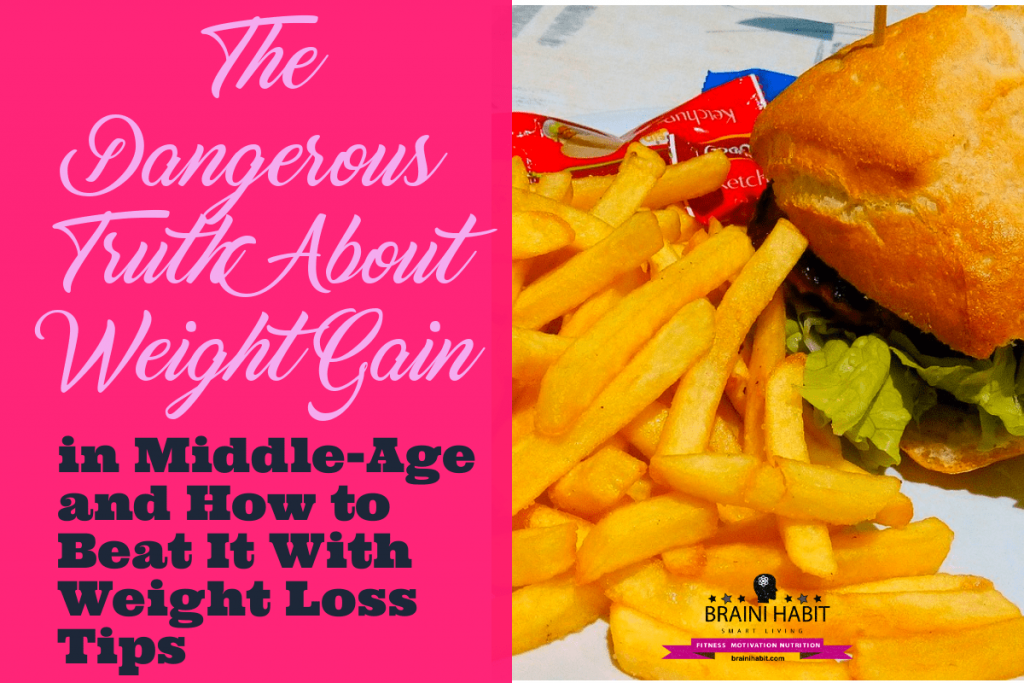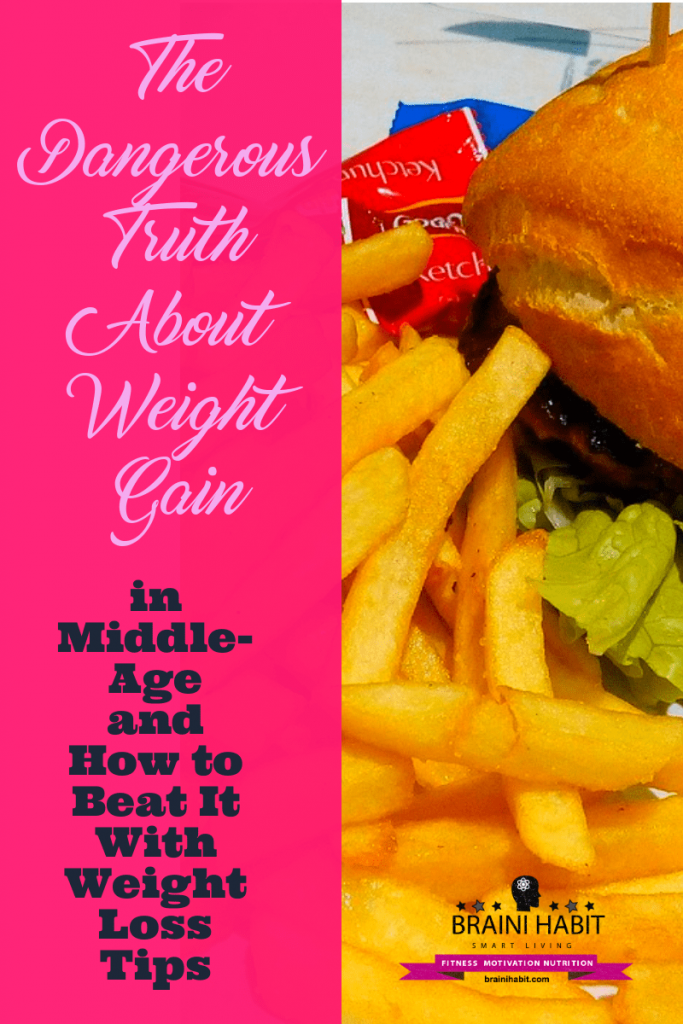There are many reasons for weight gain after your 40s. But it isn’t just your weight that is not the same as when you were younger.
Your sleep quality, your physical activity, and your hormones are not the same either.
Now you do not have room for poor dietary choices, as your metabolism has slowly started to decline.
Despite that, there is still a way to control your weight gain and the answer is not in a specific diet.

- What happened to your metabolism?
- Do not follow a restrictive diet
- Be flexible in your meal planning
- Self-control and self-monitoring
- Start your day with protein and try to add it to every meal
- Eat more fiber from whole grains, fruits, and vegetables
- Sleep more and reduce stress
- Stimulate your muscles and metabolism properly
- Consult with a specialist
- The bottom line on weight loss tips for weight gain in middle age women
What happened to your metabolism?
The calories that we burn daily are mostly not due to physical activity, but due to our basic metabolic rate (1).
Basic metabolic rate is the amount of calories needed by our body to simply maintain all normal functions of organs and tissues and thus keep us alive.
Some tissues are more metabolically active than others (2).
While muscle is not as metabolically active as some tissues, it compensates with size.
It is almost 3 times more metabolically active than fat tissue and makes up more than 30% of our total body mass, which makes it one of the main drivers of our metabolism (3).
However, restrictive dieting and excluding whole groups of foods will result in not just fat loss, but also muscle loss.
We have already started to lose muscle as we age – after the age of 50 muscle mass decreases with at least a percent every year (4).
While the metabolism of all tissues is reduced with age, fat tissue is not affected as much as muscle (5). This is why it is now easier to gain fat.
Furthermore, middle-age is a period when most women enter menopause.
Because of the natural decrease in levels of estrogen, studies show that this period contributes to the accumulation of fat around the abdomen (6).
This type of fat is called visceral while the type of obesity is called central. Evidence suggests that it contributes significantly to chronic diseases such as diabetes and atherosclerosis (7).
Take-Away:
After the age of fifty, we start to slowly lose our muscle mass which also affects our metabolic rate and makes us more susceptible to gain fat.
Do not follow a restrictive diet
Most women usually start a diet to lose weight, but they do not realize that the excess amount of fat is just a symptom.
As they struggle to lose more than just a few pounds, many women decide to start a more restrictive diet.
And if it is too restrictive, it will result in weight loss, but at very high costs.
First of all, science has proven that the only factor that determines the rate of weight loss is the size of the caloric deficit created (8).
A caloric deficit is when we consume fewer calories than we burn.
While consuming fewer calories is ultimately the result of most weight-loss diets, if not done correctly this will lead to the loss of both muscle and fat.
As we mentioned this will deal serious damage to our metabolism.
Secondly, you need a diet that is sustainable for the long term.
However, if you are following a restrictive diet, the chance to stick with it for the long term is quite small.
And once you go back to your old eating habits, you will also go back to your weight.
The chance is that you might even gain more weight than before because you lost some muscle and that slowed down your metabolism.
This is called weight-cycling or yo-yo effect and it is very common for middle-aged dieters.
Overall, it is better to focus on the causes of weight gain and change your habits, instead of focusing on your weight.
Do not follow short term restrictive diets that will only temporarily affect the symptom.
Take-Away:
Following a restrictive diet can further increase the risk of losing muscle mass and slowing down your metabolism, which ultimately leads to weight gain.
Be flexible in your meal planning
A great place to start is to find out your actual energy intake. Studies show that people tend to underestimate the amount of calories they eat (9).
This way you will find which are the most caloric foods that you eat every day, as well as to detect your unhealthy habits related to eating.
However, the goal of counting calories should be not to develop rigid boundaries, in which you have to fit every day.
Instead, it should be to increase your understanding of the effect of different foods on your energy intake and weight.
Scientific evidence shows that if the diet does not allow flexibility, it is related to higher disinhibition – severe lack of restraining and increased overeating behavior (10).
By developing your knowledge, you can restrict your intake and allow yourself more flexibility in your diet.
You can still enjoy most of your “treats” while controlling how much and how often you consume them.
Further evidence suggests that successful flexible dieting depends on sticking to your goals and focusing on the long run, instead of trying to compensate for overeating (11).
The study also associates the “all or nothing” mindset with worse weight control and higher risk for overeating, binge-eating and eating disorders.
This is why a balanced and flexible approach is best in order to best adhere to your diet and achieve long-term weight loss.
Take-Away:
Flexibility with the diet allows for better adherence to it and the more sustainable it is, the more effective for weight loss it is as well.
Self-control and self-monitoring
Self-monitoring is shown by multiple studies to be associated with weight-loss (12). It includes both diet and exercise, as well as self-weighting.
Weighing yourself regularly will help you in two ways. First of all, it will help you assess the effect of diet and exercise.
Secondly, if you are trying to maintain your weight, it will help you detect fat gain early before it escalates.
Apart from monitoring the quality and the amount of food that you eat, you can also control the way you eat it.
For example, control the speed at which you consume food. A study involving 30 healthy women showed that those who eat slower have decreased overall energy intake (13).
Another study shows that this observation might be due to increased secretion of hunger-suppressing hormones when a person eats slowly (14).
Self-monitoring helps us become more mindful of the way we eat.
Studies show that when we become more aware of our unhealthy habits, we are much more likely to achieve long-term weight loss (15).
Such unhealthy habits include:
- eating out of boredom
- eating under emotional affect or depression
- eating food just because we can easily access it
- not stopping when we are full
- snacking mindlessly in front of the TV or PC
- avoiding regular exercise
Being mindful of these habits and your eating in general will allow you to control your intake while still having the flexibility to enjoy all the foods you like in moderation.
Take-Away:
Self-monitoring and self-control allow for better adherence to your weight loss plans and better long-term weight control.
Start your day with protein and try to add it to every meal
First of all, having a protein breakfast is shown by studies to reduce hunger and voluntary food intake (16).
There is evidence that these effects are greater in comparison to high carbohydrate breakfasts (17).
Furthermore, science suggests that hunger control is aided by the effect of protein on ghrelin (18).
Ghrelin (the hunger hormone) is a hormone released by the stomach that stimulates hunger.
Secondly, compared to high-protein breakfast, high-carbohydrate breakfast can lead to higher spikes of insulin levels.
This increases the transport of tryptophan from the blood to the brain (19). Tryptophan is an amino acid that gets transformed into serotonin in the brain.
Higher serotonin levels lead to effects commonly experiences after eating something sugary – relaxation, sleepiness, and reduced alertness.
These are effects that we want to avoid during the morning and high-protein breakfast can help.
Also, when dieting to lose weight, protein prevents the loss of muscle mass and thus helps maintain a higher metabolic rate (20).
By affecting satiety and metabolism, dietary protein is proven by studies to prevent weight gain (21).
Protein takes longer for the body to digest it, which also increases the amount of energy burned in order to absorb it and store it (22).
A study compared low-fat and low-carbohydrate diets while matching the amount of calories and protein, and found out that both groups lost the same amount of fat (23).
It shows that enough dietary protein improves satiety greater than fats or carbs and together with a caloric deficit is the main requirement for successful weight loss.
Protein also affects bone health positively and reduces the risk of osteoporosis (24).
Furthermore, dietary protein helps with the treatment of “fatty-liver” – a condition related to overeating on fats and obesity. It is proven by studies to improve the antioxidative capacity of the liver (25).
Take-Away:
Protein increases satiety, burns more calories for digestion, and helps preserve muscle mass and metabolism. It is especially good for breakfast as it also improves alertness in the morning.
Eat more fiber from whole grains, fruits, and vegetables
A systematic review of multiple epidemiological studies about dietary fiber show an association between higher consumption and lower body weight (26).
This might be due to increased levels of satiety after consuming more fiber, as shown by other studies (27).
There are two main types of fiber – soluble and insoluble and both of them improve satiety.
Furthermore, the soluble type of fiber slows down the absorption of carbohydrates and cholesterol.
The result is better management of blood sugar and lipid profile.
One of the most commonly consumed foods, that are rich in fiber are oats.
They are whole grains that contain the soluble type of fiber called beta-glucan, which is shown by studies to improve greatly satiety (28).
More foods rich in soluble fiber are fruits, legumes, and seeds.
On the other hand, insoluble fiber also has additional health benefits – it helps digestion by acting as ballast and helps fight constipation.
It also reduces the risk of colon cancer. Foods rich in insoluble fiber are most vegetables, legumes, and grains.
Some fruits and green vegetables not only high in fiber but also pack very low amounts of calories.
The recommended amount is at least 400 grams of fruits and vegetables daily.
Consuming more of them is shown by a systematic review of 23 studies to enhance weight loss and reduce the total amount of body fat (29).
For example, consuming a salad prior to a meal is related to reduced energy intake during the rest of the meal and lower total caloric intake (30).
The recommended amount of fiber is at least 25g/ day.
Take-Away:
Good sources of fiber such as whole grains, fruits, and vegetables are shown to improve hunger control and aid weight loss, while also providing additional health benefits.
Sleep more and reduce stress
According to studies, stress-management is a very effective method for improving weight loss success (31).
Methods for stress-relief such as meditation, breathing techniques, and brain-dump are all beneficial.
Sleeping also relieves stress. Even just a day of sleep deprivation is shown by evidence to significantly raise stress indicators such as cortisol (32).
Furthermore, disturbed sleep is suggested to increase hunger and worsen weight control.
Studies investigating the amount of energy consumed before and after sleep deprivation show increased caloric with 500 kcals on average (33).
Another study with more than 1000 volunteers found out that sleep deprivation also affects the levels of hormones related to appetite, such as leptin and ghrelin (34).
That elevation in the hunger hormone and reduction in the levels of leptin – the hunger-suppressing hormone – are most likely the reason for increased food intake after insufficient sleep.
More studies show that when sleep duration is shorter than 7-8 hours, there is a higher risk of weight gain and obesity (35).
A massive meta-analysis involving more than 600,000 subjects in total also finds an association between obesity and shortened sleep duration (36).
Take-Away:
A massive body of research shows that sleep is strongly related to hunger control and obesity. This is why it is best to give yourself enough quality sleep regularly and find ways to cope with stress.
Stimulate your muscles and metabolism properly
Apart from proper diet and enough protein, exercise can also help you preserve your muscles and metabolism when dieting.
Furthermore, it can add additional calories burned to your daily energy expenditure.
While cardio does burn a lot of calories it is not a good choice for exercise, because it does not help preserve muscle mass (37).
On the contrary, it might even promote muscle loss (38).
Evidence shows that cardio might also increase the amounts of stress on the organism and lead chronically elevated levels of cortisol – the stress hormone.
Evidence collected from hair samples about the cortisol levels of over 300 endurance athletes showed significant long-term increases when compared to control subjects (39).
On the other hand, training with weights, not only burns a similar amount of energy, but it also stimulates muscle growth.
A study shows that adding resistance training leads to better improvement in body composition (40).
The result of resistance training is that you burn more energy both inside and outside of the gym.
A study comparing 44 women who have similar diets and are either doing cardio or weight training found out that the latter preserved much better their metabolic rate (41).
Another, much more recent study included 94 female participants, again comparing cardio to resistance training (42).
Again the results showed that resistance training allowed them to keep more muscle during weight loss and preserve their metabolism.
It is a good idea to hire a personal trainer that will regulate your training intensity and monitor your progress.
And do not forget that the gym is for everyone, no matter the age.
Take-Away:
Training with weights can help you restore and preserve your muscle mass and metabolism. It also helps you burn an additional amount of calories during training.
Consult with a specialist
Scientific evidence shows that motivational interviews with professionals improve weight loss (43).
Consult with a specialist creates the feeling for responsibility, which helps you stick to your weight loss plan better.
Also, a medical doctor or a dietician can provide you with professional advice according to your individual needs and characteristics.
The plan created by a medical specialist will be also according to your health status and any other chronic conditions that you might have.
Obesity, especially around the abdomen, increases the risk of cardiovascular disease, cancer, and diabetes.
This is because it is related to elevated levels of bad cholesterol, blood pressure and inflammatory mediators (44).
Also, some studies suggest that there is a relationship between central obesity and Alzheimer’s (45).
The best approach for everyone should be individualistic when it comes to weight loss.
Especially if you are going through menopause, it is best to consult yourself with a physician.
A medical doctor can accurately decide if you are in need of a diet, or maybe hormone replacement therapy is the better option.
Take-Away:
Consultation with a specialist can help you stay motivated and achieve better results. The personal approach, suited to the specific needs of the patient is the best one when it comes to weight loss.
The bottom line on weight loss tips for weight gain in middle age women
Although it is easier to gain fat with age, this is not an excuse to lose control over your body weight.
Instead of dieting and achieving only short-term results, it is best to develop healthier eating habits.
Those habits will allow you more flexibility and adherence to your plans because the most important factor for weight loss is consistency.
Additional lifestyle changes are also required for weight loss, such as proper exercise and improved sleep.
In order to achieve the best results, improve your overall health, and deal with conditions such as menopause it is best to consult yourself with a medical doctor.





